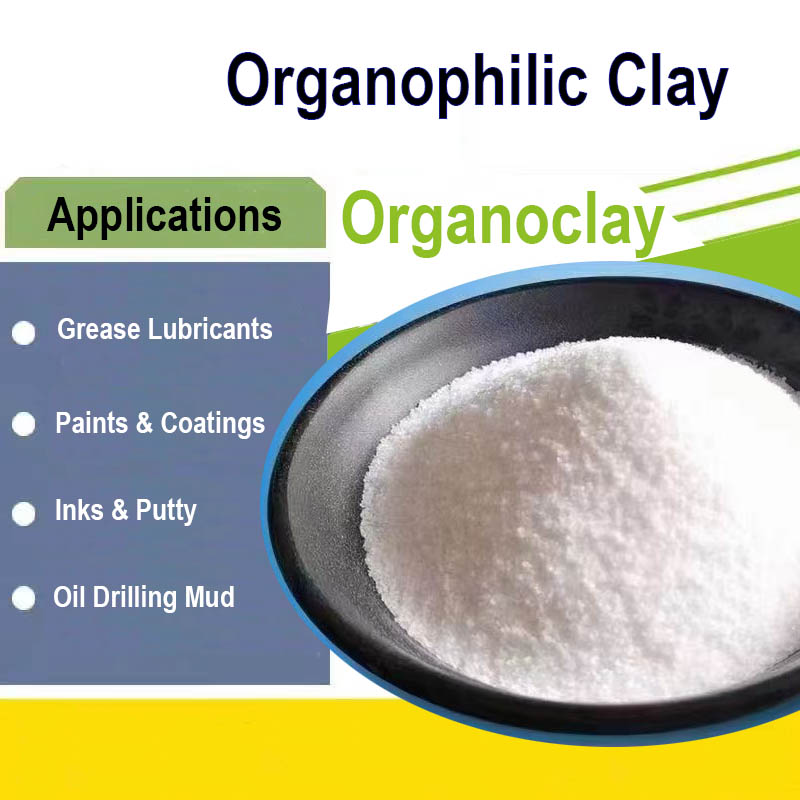Oilfield Chemicals Organophilic Clay
What is Organophilic Clay?
Clay from Zhejiang Camp-Shinning is altered by adding organic chemicals, most often quaternary ammonium compounds. Because of their affinity for clay, these compounds are considered organophilic. As a result, oil-based fluids, which include hydrocarbons, are the clay’s preferred medium.
Most organophilic clay is used in oilfield drilling chemicals for oil and gas. The rheology, filtration, and solids suspension of drilling muds are all under the command of the organophilic clay. Organophilic clay stabilizes the mud system by thickening it, preventing fluid loss when drilling through porous rocks. There are various applications for organophilic clay’s ability to separate, purify, and modify organic molecules.
What are Oilfield Chemicals?
Organophilic clay’s most common usage in the oilfield chemical companies is as a component in oilfield drilling chemicals. Drilling muds have many uses in the drilling process, including keeping the drill bit cold and lubricated, transporting the cuttings to the surface, and stabilizing the wellbore. Drilling muds with additional organophilic clay are more effective and facilitate more rapid drilling.
Drilling muds’ flow characteristics are optimized, and drill cuttings are more easily removed from the wellbore, thanks to this additive’s shear-thinning qualities. Drilling fluids may flow efficiently while a thin filter cake is formed on the wellbore walls thanks to the presence of organophilic clay, which helps to limit fluid loss into the surrounding formations.
Organophilic clay helps maintain a stable mud system by suspending and regulating the flow of solid particles in the drilling fluid. Organophilic clay may be used into drilling mud compositions to help oilfield production chemicals and oilfield operators increase drilling efficiency.
Generic Name
The general term for oilfield chemicals that include organophilic clay used in oil-based drilling fluids for rheological modification is “Organophilic Clay Additives for Oil-Based Drilling Fluids.” These additives affect oil-based drilling fluids’ rheological characteristics.
Bentonite clay forms the foundation of organophilic clay additions. Bentonite clay has significant swelling and colloidal characteristics. This is added using organic molecules like quaternary ammonium salts. This alteration increases clay’s affinity for oil-based fluids and decreases its interaction with water.
This also additions rheologically modify oil-based drilling fluids. They increase fluid viscosity, thixotropic behavior, and suspension properties, enabling successful drilling in varied wellbore circumstances. These additives manage drilling fluid flow, carry drill cuttings to the surface, and stabilize wellbores.
Technical Data
Organophilic clay-containing oilfield compounds are available as a buff to tan powder. Typically, the moisture content ranges from 2.0% to 5.00%. The maximal loss on ignition, which represents the weight loss at 1000°C, is 482.5%. A sieve analysis reveals that at least 75% of the finely-ground organophilic clay passes through a 100-mesh screen.
Product Description
Organophilic clay-containing oilfield chemicals improve drilling fluid performance, especially diesel-based formulations. Organophilic clay is modified bentonite, a clay mineral with colloidal and swelling characteristics. Modifying bentonite with organic components such quaternary ammonium salts imparts organophilicity. This change increases the clay’s affinity for oil-based fluids, gelling and viscosifying the drilling fluid.
Zhejiang Camp-Shinning’s organophilic clay is optimized for oilfield chemical solutions, and drilling fluids, where the continuous phase is diesel or other oil-based compounds. It increases drilling fluid viscosity, thixotropy, and suspension. Organophilic clay in oilfield drilling chemicals improves wellbore stability, cutting removal efficiency, and lubricating and cooling.
It is versatile beyond oilfield production chemicals. This enhanced organophilic clay works with synthetic drilling fluids. Synthetic fluids outperform oil-based fluids in thermal stability, environmental performance, and lubricity. This also enables sustainable drilling by being compatible with synthetic-based fluids.
Product Application
The composition of oilfield drilling fluids relies heavily on organophilic clay. Drilling fluids include 2-10 pounds per barrel (5.7-28.5 kg/m3) of organophilic clay, depending on viscosity and base oil. Using a diesel-based fluid as the continuous phase speeds up the yielding of organophilic clay and increases its viscosity to the desired level. During first mixing, oilfield chemical companies shouldn’t subject the system to too much stress. The performance of fluids is diminished when they are overtreated.
The speed with which organophilic clay reacts may be affected by using synthetic oils as the basis fluid. Organophilic clay’s full potential may not be reached until a longer period of time if using a synthetic oil. Constant monitoring and management of the drilling fluid system is essential for optimizing performance without overtreating.
Organophilic clay dosage and treatment are necessary for drilling fluid systems. Oilfield chemical companies need to consider the requisite viscosity characteristics, base oil type, and well conditions when determining dosage and fluid performance.
Product Advantages
Oilfield chemicals containing organophilic clay from Zhejiang Camp-Shinning offer several advantages that contribute to their widespread use as an oilfield chemical solutions:
Gel Structure and Viscosity
Allows heavy components like solid additives to be suspended in oilfield drilling fluids by giving them a gel structure and viscosity. This maintains fluid movement and prevents particles from settling, enhancing the efficiency of oilfield chemical solutions.
Improved Hole-Cleaning Capacity
The viscosity of the drilling fluids is increased, which improves their ability to clean the hole. It aids in the removal of drill cuttings and the prevention of borehole obstruction.
Enhanced Filter-Cake Quality and Filtration Characteristics
Zhejiang Camp Shinning’s organophilic clay additions boost the quality of the filter cake generated on the wellbore walls. Wellbore stability is increased, and fluid loss into the formation is decreased, as a result of the better filtering properties.
Effective Gelling Agent for Casing Packers and Fluids
Used by oilfield chemical companies as a gelling agent in casing packers and other fluids. The wellbore may be more isolated and protected thanks to the seal it helps establish.
High Yield Point and Stability in Various Oils
Shows a high yield point despite the use of drilling oils of several types. As a result, oilfield production chemical companies can be certain that their drilling fluid will behave as expected, no matter how extreme the conditions get.
Wide Application Range
Has a flexible spectrum of use that encompasses both low and high polarity systems. You may use them in several formulations of drilling fluid to meet the needs of a variety of well conditions and fluid specifications.
Product Usage
Organophilic Clay is a multipurpose oilfield chemical that is widely used in drilling operations. Its dose in drilling fluids normally varies from 2 to 10 pounds per barrel, 5.7 to 28.5 kg/m3. The precise quantity utilized is determined by a number of variables depending on oilfield chemical companies.
Drilling fluids with variable viscosities are required for various drilling applications to enhance drilling efficiency and wellbore stability. To produce the appropriate viscosity properties, the dose of organophilic clay may be changed within the defined range.
The mixing mechanism used during drilling fluid preparation also has an impact on the use of organophilic clay. The kind of mixing equipment used, the intensity of the mixing, and the overall system design may all have an impact on the dispersion and integration of the clay into the fluid. These considerations must be considered by operators when determining the proper dose of organophilic clay for consistent and successful outcomes.
Product Pack Size
Organophilic clay goods from Zhejiang Camp-Shinning is used in the oilfield chemical companies come in normal package sizes of 25 kg and 50 kg, which make them easy to handle and store. These pack sizes are good for a wide range of drilling jobs from oilfield chemical company, from small ones to big ones that need a steady supply. Also, Zhejiang Camp-Shinning give oilfield chemical companies the option of customizing pack sizes based on their needs.
Product Storage
To keep their quality and efficiency, oilfield chemicals with organophilic clay must be kept in the right way. Here are some important things to think about when keeping organophilic clay:
Avoid high-intensity extreme pressure and prolonged exposure to strong sunlight
Should be maintained under regulated pressure and heat. Too much pressure or heat may damage a product. Exposure to bright sunshine may also degrade clay. Organophilic clay should be kept cold, dry, and away of direct sunlight.
Keep the container closed
When the organophilic clay is not being used, it is important to keep the container or kraft paper bag closed. This keeps it from absorbing wetness and keeps it from breaking down. Moisture can hurt the way organophilic clay works. It can cause the organoclay to stick together or work less well.
Keep away from heat, sparks, and flames
Avoid accidents or the risk of a fire so keep it away from flammable products. Keep a safe working environment, organophilic clay must be kept in a special storage area away from burning materials and in accordance with fire safety rules.
Oil Well Chemical Additive Organophilic Clay Oilfield Chemical Additive Organoclay Oil Fluid Additive Rheological Additive
Chemical additives to oil wells are a key part of making oilfield operations run better and more efficiently. One of these additives is organophilic clay. It is a flexible oilfield material that is used to change the way oil-based drilling fluids flow. Its main job is to change the rheological qualities of the fluid, which improves the viscosity, suspension, and gel strength.


